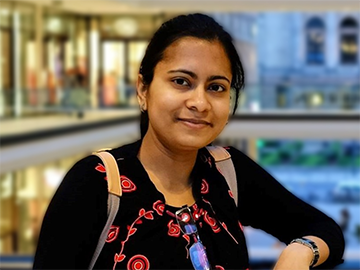
Kavita Devi
In this installment of Senior Member Insights, OPN talks with Kavita Devi—an assistant professor at the Indian Institute of Technology (IIT) Dharwad, India. Devi completed her Ph.D. in photonics at ICFO–The Institute of Photonic Sciences, Spain, where she also spent time as a postdoctoral research fellow before receiving the Ramanujan Fellowship to work at the Indian Institute of Technology (IIT) Bhilai. Devi’s research interests include optical parametric oscillators in all time scales, nonlinear frequency conversion, frequency comb generation and nonlinear optical properties of novel materials.
What first interested you in pursuing science?
During my school days, I took many subjects that were part of our education curriculum. I started enjoying the science classes the most, as I understood and experimented with the things around me. As a kid, I used to play with available lenses and mirrors to magnify nearby objects and make images.
Later during my bachelor’s studies, I took physics as my major course. With my strong interest in lasers and photonics, I pursued my master’s degree in these subjects to enhance my knowledge in these fields.
What aspect of your current work do you find the most interesting or exciting?
Structuring and establishing a laboratory from the beginning is an experience in and of itself. Although getting funding is challenging, I am currently building things from scratch, which is very intriguing. As a country looking forward to fast development, India has many sectors in which one can use their talent and knowledge.
At a university, having various departments just a few steps away gives a solid platform for interdisciplinary research, and interacting with people with different scientific backgrounds is very captivating. Also, teaching is an integral part of my current job profile, which brings excitement every day as I can interact with undergraduate students and their curious young minds.
What tips for successful networking do you have for early-career professionals?
One should never let opportunities go. If it comes to you, grab it. With dedication, one can have a fruitful outcome. Early-career professionals should travel and attend meetings and conferences whenever and wherever feasible—this is an opportunity to meet people, discuss their ideas, and get to know others’ findings. They should deliver as many talks as possible, as this brings wide visibility of their work and boosts their self-confidence, which is immensely helpful later while doing independent research.
Who knows, maybe a ground-breaking invention can be started from a small chat at a conference while standing in a queue for a cup of coffee.
What professional resources do you rely on to stay active and engaged with your field?
I keep myself updated by reading research articles regularly. Also, I keep track of new happenings and breakthroughs in other fields as it can help my research work. Furthermore, I try to attend conferences and seminar talks when I can talk with people discussing their work in a more detailed way. Also, I teach courses related to my work to undergraduate students in which, together with the basics, I try to cover state-of-the-art ongoing research.
What’s the best career decision you’ve ever made, and why?
Pursuing a Ph.D. in photonics at ICFO with OSA Fellow Majid Ebrahim-Zadeh as my supervisor was the best career decision I have made. He not only supervised me but also provided enormous encouragement and support that gave me enthusiasm and confidence to face new challenges at any time. His vast knowledge in the broader field of science and technology and industrial experience enriched my growth as a researcher. His ever-friendly attitude gave me the freedom to express, explore and implement new ideas.
Another major turning point in my career was when I was admitted to the Indian Institute of Technology (IIT) Guwahati for my master’s degree. Doing such a course at such a prestigious institute gave me the vision and mission to explore the field of optics and lasers experimentally. In my opinion, the academic environment in a student’s early days plays a significant role in paving their career paths and decisions.
What is one piece of advice that you wish you were given as a student/early in your career?
The one piece of advice I wish I was given as a student was not to get demotivated if your goals are not achieved in the first go. Someone else’s success does not mean your failure. With continuous perseverance, hard work and patience, one can certainly attain that. It is just a matter of time.
How do you hone your leadership skills?
For career development, leadership plays a major role. With such a skill, a team leader can communicate with and motivate the research group, handle responsibilities and solve problems. A leader needs to be an inspiration, not a dictator for the team.
My current work demands strong leadership skills as it involves leading a research team that comprises researchers at different levels, from undergraduate interns to postdoctoral fellows. To improve my leadership skills, I maintain discipline and sincerity in the workplace. I remain time-bound, avoid conflicts, and never step away from taking responsibility.
At this point in your career, what are you most looking forward to next?
Currently, I am working toward establishing my lab and expanding my team. I am also writing and submitting proposals for some good projects, and I’m looking forward to new collaborations.
Getting a good amount of funding for research is a challenging task; it requires time and dedication. Furthermore, as the mother of a three-month-old baby, I need to manage my time and work schedule very efficiently.
If you weren’t in the sciences, what would be your dream career?
My dream career, if not in the physical sciences, would be an archaeologist. The idea of getting to know history with present evidence fascinates me. Plus, the requirement of research skills and photography in a flexible approach and around the globe is very exciting.
